Exponent II's Blog, page 7
September 30, 2025
The Space You Make and the Space You Take

The space you make and the space you take. This phrase has been running through my head since I heard it at a faith-based professional meeting a few weeks ago (I work at a Catholic school). It’s a simple phrase yet one I have never before heard and which has impacted me deeply. How much better would the world be if we all paused from time to time to reflect on this? As I have digested this phrase, here are thoughts I have had.
The Space.Space could refer to physical space, emotional space, spiritual space, or mental space. I eagerly look forward to my regular acupuncture appointments because my acupuncturist creates a calming physical space with soft lighting, a scent that I think is either incense or an essential oil diffuser, and comfortable furnishings. The physical setting creates a calmness that allows me to connect with my emotions and mental state to be able to communicate the status of my ongoing health treatments. Although acupuncture is primarily treating physical health issues, it invariably includes a spiritual component as I leave feeling calm and settled.
The Space You Make.We create space for ourselves and others. Understanding the space we make for ourselves requires self-awareness. We have to know ourselves: our needs, wants, thoughts, and emotions. Creating a space that supports our needs and allows us to make a contribution can require experience as we navigate creating space in different settings: personal, educational, professional, religious, etc. Creating a space that supports others requires imagination, empathy, flexible thinking, and a willingness to both give and receive feedback.
The Space You Take.We take space for ourselves, we also take space from others. Based on my life experience, I suspect that most women need to take more space. See this research done at BYU: “When Women Don’t Speak.” In a world largely designed by men for men – for one source see Caroline Criado Perez’s book Invisible Women: Exposing Data Bias in a World Designed for Men – I suspect that men often need to be aware of the space they take and how that space impacts in positive or negative ways other people experiencing that space.
The space you make and the space you take.As we both create and take space, it can be valuable to step back and consider questions such as:
What kind of spaces are we making? At Exponent II community is valued over conformity. In my years as a blogger, I have marveled at the wide range of perspectives and beliefs amongst the bloggers. Are the spaces we are creating spaces where people can be vulnerable? Where their wounds can be seen and held? Are we creating places where people have opportunities to contribute the gifts that they each individually have? How are decisions and resources made and allocated in the spaces we make and take? Is it a space of collaboration? Or is there a system of dominance and power over others?As we move through the world, it seems more and more clear to me that we can create spaces of joy, wonder, awe, peace, friendship, kindness, and healing. We can create these spaces for both ourselves and others. In turn, we can be open to take the goodness that others have to offer us. This, though, requires us to take time to stop and reflect about the space you make and the space you take.
September 29, 2025
Humbled & Proud
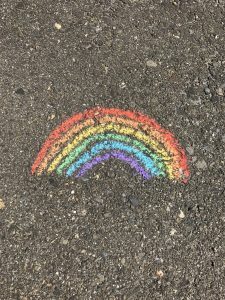
For this issue, we invited contributors to share their understanding of “pride.”
As I sit down to write this letter — my final letter from the editor, a fact I’m still struggling to fathom — I sit beside a window in Berkeley, California. Here, I have a clear view of the myriad of personalities who walk the street and watch the sunlight shift and change.
I never imagined I’d be here, on the opposite coast from where I thought I’d end up. After spending a decade in Boston — the same setting as Exponent’s early days — I, like the organization, grew and spread my branches. Would I have found Exponent at all if my best friend Carol Ann hadn’t invited me to go to my first retreat in 2015? Would I have volunteered to be a member of the readers committee? Or continued to submit my own writing to the magazine until, somehow, in summer 2021, I became its editor in chief?
I don’t know. But what I do know is this: as a person who can play the violin for the Easter program in my ward, then jet over to watch the annual “Hunky Jesus” drag show contest in San Francisco, I’m living a curious life with multiple, intersecting identities. I’m breathing meaning into the phrase “a peculiar people.” And this issue proves that I’m not alone.
Fewer words have more meanings — or are more charged — than the word “pride” in the LDS community. From our cultural fascination with Pride & Prejudice to the warnings to avoid the pride cycle repeatedly enacted in the Book of Mormon to our views about David Archuleta’s sexuality, pride is clearly on our minds. And the meanings? It’s complicated.
“Complicated” seems to be the refrain, the thematic thread uniting all of the issues of Exponent II that my team and I have shepherded from email submissions into the printed magazine you hold in your hands. Each person’s journey is nuanced, complex, and deeply individual. The stories in these pages are no exception.
For this issue, we invited contributors to share their understanding of “pride.” The spectrum of responses can be seen through exquisite poems, a book review, Miriam Bay Sweeney’s theological treatise on fear, Julia Rea Marostica’s sacrament meeting talk about celebrating differences, and what printmaking rainbows has meant for artist M. Alice Abrams. In interviews with field experts Dianne Orcutt, cofounder of Aspiring Mormon Women, and Callan Olive, a therapist, we gain perspective on how to cultivate confidence and self-worth.
Several personal essays tackle “pride” in the context of motherhood. L.R. Encinas calls attention to miscarriage, Erin N. Price wrestles with infertility, and Alyssa Witbeck juggles grad school with a toddler. Judith E. McConkie writes about finding, in her eighties, a tentative pride in aging while calling out the ways others minimize her.
LGBTQIA+ voices permeate this issue. To name just a few, Julie Theriault shares what embracing pride looks like for a bi Mormon American. Andee Bowden shows the hard-won pride and self-understanding they have found in labels such as ADHD and autism. Aisling “Ash” Rowan and Dani Westwind Blatter Macarthur both examine their gender transitions through the lens of music, and Hannah Bryan describes the violence of the recent updates to the Church’s handbook that further excludes trans members from our communities.
Like many of our contributors, “complicated” also describes my sense of pride: as a writer and citizen of the world during a terrifying time in history; as a woman rebuilding a life after unspeakable pain and loss; as a queer Mormon feminist navigating my own peculiar journey; and as an editor who’d hoped to stay in this role for five to six years like my incredible predecessors.
I’m saddened to step down due to the financial limitations of this mostly volunteer organization. I look forward to a day when editors do not have to choose between this job — a labor of love — and their day-to-day survival. By contributing to Exponent II, whether it be through subscribing, donating, or engaging with these important voices, you are helping put that hope into action. When we invest in ourselves and take our work and value seriously, we sustain a vision for all of us to dream and live bigger.
I feel enormous pride in the work my team and I have done over the last four years, particularly with my managing editor, Carol Ann. This is our seventeenth issue of Exponent II. During our tenure, we established honorarium payments for our contributors, spearheaded community funds, began a writing workshop series and quarterly launch parties, restarted the monthly newsletter, celebrated the organization’s 50th anniversary in a double-length issue, and more. I’m so humbled to have been a part of this magazine and to have been entrusted with (and shaped by) so many of your stories; it is a role I’ve held as sacred.
I have the highest faith in Millie Tullis and Natasha Rogers, the incoming editorial team, who worked with us on each step of this beautiful issue. I’m leaving this treasure of a tradition in kind and capable hands.
With Pride,
Rachel
(Photo by Alex Jackman on Unsplash)
From the Blogger Group Chat: The End of President Nelson’s Tenure
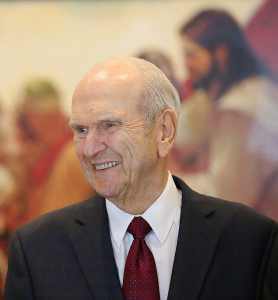 Linda Hamilton:
Linda Hamilton:I’m kind of panicking about Oaks presidency. I worry restrictions on LGBTQ will only get worse.
Bailey:At the press conference following President Nelson’s sustaining, I had a very strong impression that he was called to this position because there were things he needed to learn. I hope that he, a long with all of us, learn what we need to learn. I am in awe of God’s patience and unrelenting, unconditional love for their children that they give us time and space to learn and grow.
Michelle Bulsiewicz:I appreciated the rapid successions of changes President Nelson made in the beginning of his presidency. I liked that he was trying to move things forward and showing the church as whole that they didn’t have to do things a certain way just because that’s how they’d always done them. I do wish that a man of his age could have been allowed to retire with his family at the end of his life instead of being in a position to run an entire church. I also have a lot of fear about what kind of leadership President Oaks will bring and what that will mean for the LGBTQ+ community in particular.
M. Avila Nilsson:I am grateful for how many years of service President Nelson gave to this church. It must have come with a lot of sacrifice, and there are many things he did that were so good. I really appreciated President Nelson’s calls to be peacemakers. I would love for people to take this opportunity to really work on building peace. I think the bridge building he did with leaders of the NAACP was a really important baby step. I also really struggled with him as the prophet at times. He was such a representation of how patriarchal this church is. I fear that patriarchal legacy will prove to be more long-lasting than his calls for peacemaking.
Rose:I mourn along with the family members and millions of LDS members at the passing of President Russell M. Nelson. He lived a long and productive life, and I honor him for his many accomplishments.
In his final birthday wish, he said, “I believe we are all children of a loving Heavenly Father. But no matter your religion or spirituality, recognizing the underlying truth beneath this belief that we all deserve dignity is liberating — it brings emotional, mental and spiritual equilibrium — and the more you embrace it, the more your anxiety and fear about the future will decrease.”
I hope the Church of Jesus Christ of Latter-day Saints will follow his advice and treat all with dignity, including its LGBTQ members, those with honest concerns about the Church, and those who suffer.
Its upcoming president, Dallin Oaks, is known for anti-LGBTQ rhetoric. I pray that with his upcoming appointment as prophet, he will choose words that reflect the Savior’s loving kindness and not divisive attacks on the most vulnerable of God’s children.
Kara Stevenson:I am thankful for some of the changes President Nelson enacted during his time as prophet. There were much needed adjustments made to the endowment ceremony. Though they were baby steps, they were made in the right direction. Two hour church and calls for peacemakers mark some of the highlights of his tenure. I wish his rhetoric could have aligned more fully with such calls, but I can acknowledge his humanness and therefore accept his shortcomings.
I imagine the role of leading a worldwide church would be a difficult one. I’m confident that he cared about holding such a role, and that he did the best he could with the experiences, understanding, and wisdom that he held. My hope moving forward is that we, as a church, can worship prophets a little bit less and worship God a little bit more. We should not obey a man simply for their title alone. Now more than ever, we need to become a people who are proactive in their faith.
April Young Bennett:When Russell M. Nelson became president, NBC News quoted me saying that I wasn’t expecting any big changes from him. I was pleasantly surprised to be proven wrong. He made some important changes to the temple ceremony that feminists had advocated for years, like removing language requiring women to “hearken” to and “give” themselves to their husbands but not vice versa, which were wonderful improvements despite the unwelcome addition of the word “preside” to the marriage ceremony. He deleted the Monson-era LGBTQ+ exclusion policy, even after defending it so vigorously when President Monson was alive. He ended the ban on women as witnesses to baptisms and sealings. He opened the door for couples to have inclusive weddings with their mixed faith loved ones by ending the 1-year wait penalty for civil marriage. I audited woman-friendly changes to church policy within the first three years of the Nelson administration, and the list was impressive, considering that I had expected virtually no progress!
So I’m not going to make any dire predictions about an Oaks presidency because my track record for predicting well is not good. Or maybe I should? Because I would really love to proven wrong again.
Candice Wendt:I feel kind of uncomfortable sharing my thoughts so soon after his death. But my goal is to discuss and acknowledge how LDS leaders and leadership systems impacts our lives and to open a space for members to be honest about that, not to memorialize his life or contributions.
Liminal times in LDS leadership don’t mean quite as much to me anymore because I’m no longer waiting for or counting on change from the top. I can’t live in such a way that I’m dependent on what the president of the church does to be okay with my family situation and spiritual life. I need to feel safe and okay here and now. Claiming authority to determine how I engage, what I believe and value, and where my boundaries are is empowering and healing to me. I can still value Mormon spirituality and benefit from the community without waiting for dysfunctional traditions in the Church to be made right. Much of such engagement can happen outside the official Church. Last weekend at an Exponent II Retreat, I witnessed Mormon women preserving and developing LDS culture and practices in their own way and on their own terms, under no man’s thumb. I’m much more interested in and hopeful about how Mormons are changing and growing on the ground than anything happening in the Q15.
During Pres. Nelson’s tenure, he stripped down the member experience to what he saw as the essentials. This was both harmful and elucidating to me. As community life and a collective sense of Mormon identity diminished, I realized what he treated as core were things I didn’t value so much at this point: temple worship, building temples, and aiming for an optimal afterlife. I did a bunch of family history and temple work in my 20’s, and while I benefitted, I’m not experiencing it as my ticket to personal progress for every decade to come. I need community life and experiences outside the temple to grow. And I need a community that accommodates stages of faith that aren’t so orderly, tidy, or “growth through obedience” focused.
Pres. Nelson was (thank goodness) better at race relations than Monson was. He was willing to innovate and adapt. He did okay navigating the pandemic. He seemed to be a decent and talented person, but it appears to me his Achilles heel was being caught up in his ego. During his tenure and under his influence, follow the prophet rhetoric, quoting the first president, and general prophet adoration increased. In my opinion, his legacy of temples and innovations that seems more intent on making himself into an important figure in memory than addressing members’ needs.
As a mom, I’m deeply disappointed in some of his actions and blind spots. He was weak in supporting the young people of the Church and dialed down community support during a time when families have needed a great deal of support and many of our youth have been in crisis. He was clueless when it came to what today’s youth need and his focus on adult temple experiences probably didn’t help. The recently instituted transphobic policies are unacceptable and we’re not complaining enough about them. Under his leadership, we’re also still stuck in tactics of indoctrinating youth. Conformity and submitting one’s will to Church authorities are treated as prices of belonging. This isn’t working well: it’s insulting to today’s kids, and belonging and acceptance aren’t so rewarding when community connectedness and rewards have diminished in the context of 2-hour Church, erased Mormon identity, fewer community programs and activities, and downsized local community budgets.
I don’t think Nelson ever reached more advanced stages of faith, and his limited spiritual vision and immaturity hurt the Church and the direction he took it. The God he talked about was one of clear and predictable rewards and punishments, not of grace. He believed in sad heaven and the separation of families in the eternities, and used fear tactics surrounding this. Getting into heaven was a matter of acquiring the right cognitive beliefs. He didn’t seem to appreciate spiritual mystery, he taught the plan of salvation like something black and white like we were all in primary. He seemed too focused on the Second Coming and the next life, and not engaged enough in the problems hurting people now.
Elle K.:I respected President Nelson for not being afraid to make big changes and trying to modernize some aspects of the church that were burdensome, like shortening the three hour block, forming a relationship with the NAACP, focusing more on Jesus, and changing some (but certainly not all) of the sexist temple language. It was during Russell Nelson’s tenure that I lost what remained of my nuanced faith and stopped attending church. This was mostly an instance of correlation, but I cannot deny that there were elements of causation. The prophet idolization that proliferated under his tenure, which he seemed to encourage and enjoy, was incredibly off-putting to me, as were his patriarchal attitudes toward women and his homophobia. I was aghast at his using his position to axe the term “Mormon,” his long-held pet peeve but which the church itself had embraced, by calling it “a major victory for Satan.” I know a lot of people are anxious about an Oaks presidency, but I actually have more respect for Oaks: he and Nelson hold the same harmful views, but Oaks is more forthright and occasionally more nuanced. At least with Oaks, we know what we’re getting. Nelson, though, papered over his antiquated views with a veneer of folksy grandfatherly charm, making some of the tough things he said hit harder due to their being less anticipated. Both of them, certainly, are very confident that their views are God’s views, and I don’t anticipate that will change.
I wish Nelson’s family peace during this time of loss, and I hope that Oaks will use his new position for whatever short months or years he has left to encourage both the church, its leaders, and its people to become more like Jesus by demonstrating love for God and neighbor and preaching the gospel of peace.
Candice Wendt:Elle K., this is so well-said! Nelson has hurt my faith experience, and when I say that, people often invalidate me, defend him. Of course they do. I love how you explain the negative impacts he has had.
And I love how you seek to see beneath the veneer of grandfatherly sweetness. I think you are right. Oaks is historically a man of principle. I’m not so sure about this now that he is no longer talking about the constitution in a time when it is actually threatened. In the past, he was open and forthright, and I liked that. Lately he has said hurtful and problematic things. Long ago, I loved Oak’s talks. Found them very well-thought out and interesting. I never liked Nelson’s talks. I was like, what is this?
Beelee:President Nelson began his tenure as an apostle in the same year I was born. For literally my entire life, this man has been a fixture of the Church leadership, but he never captured my attention until becoming the president. When I sat down to study every single one of his conference talks to try to get a sense of who this man was, I found a black & white thinker who heavily focused on conditional blessings based on worthiness. I found someone who didn’t have much use for grace. At the same time, the day-to-day operations of the church were changing quickly, ostensibly for the better. I couldn’t put my finger on why his tenure rubbed me the wrong way when theoretically improvements were coming and I still can’t quite articulate what his leadership has meant for me personally with a clear sense. I remember attending a stadium tour meeting and leaving feeling cold. Was this a new way to try to reach a large, widespread church and connect with real people? Was this an ego-driven sign of hubris and prophet-worship? Trying to fairly balance the changes to the church during his tenure as president leaves me feeling decidedly mixed. His legacy and influence, for me, is a question mark.
Candice Wendt:The president of the Church wields too much power. Our leaders don’t seem to be bad or incompetent people, but they have too much control, like a sovereign/king. It’s a huge role, and they are simply not skilled, gifted, wise or visionary enough to really do a good job of it and meet diverse member’s needs. I don’t know how anyone could be. They aren’t God, but we adore and trust them like God.
I believe the gift of prophecy is something that people can experience. I also believe in God and in forming faith communities, but I think the way the LDS Church has long framed “the prophet” role is kind of a myth and delusion. Designating one person to receive guidance from God for everyone else might make us feel safer, protected and “right,” but it also infantilizes us and requires that we give our power away. It reflects early, tribal, immature stages of faith. I want a system in which leadership has power with members instead of power over members. In which we are all recognized as equals and respected as agents who contribute to decisions.
Before David O. McKay, no first president besides Joseph Smith had been called the prophet. He was so beloved that people decided to start doing this, and then it continued, which I see as unfortunate. I don’t see the GAs as prophets; I see them as high priests and administrators who can receive inspiration like the rest of us. Just look at how prophets and high priests are often different people with different roles in the scriptures. Joseph Smith, who had prophetic gifts, wasn’t very good at being an administrator, and he abused his role and exploited other people (as you know, I see plural marriage as due to his personal issues). I don’t think we can really have all the needed prophetic and administrative gifts in one person, esp. not consistently over time. It’s too big of an ask, it disempowers non-leaders, and it’s high risk. Members can find empowerment by setting boundaries and reclaiming their personal spiritual authority. This is healthy and normal for adults to do, not faithless, destructive, or sinful.
Kate Baxter:Like a lot of church things, it’s complicated.
President Nelson was a man who wore the mantle of a prophet. He came unannounced to my ward a couple of times for sacrament meeting. Our bishop was a personal friend of mine, and it was hilarious to see him suddenly sit ramrod straight as President Nelson casually put his arm around him while on the stand. President Nelson recognized that and leaned into it. In those quieter moments we got a glimpse of the man behind the pulpit.
I think President Nelson did the best he could given his own human biases and life experiences. I believe all revelation is filtered through our humanness, and it takes time for the clarity of the divine message to shine through. We have to ask the right questions and be ready for answers we aren’t expecting. That can be a lot to ask of people who already know.
I wish we had a system where our apostles were placed on emeritus status at about seventy. That would allow them to focus on their families and enjoy a kind of retirement where the work they did was less taxing than leading a church. It feels like God is waiting for us to figure this out and make this change.
On one hand, I really fear what President Oaks might do as President of the church. I think we’re in for a rocky road, especially for our LGBTQIA siblings. But I’ve also seen a softening occur when hardliners become bishops and stake presidents. It takes time, time we may not have with President Oaks, but I’m holding out hope.
September 28, 2025
Holding Space for Grief
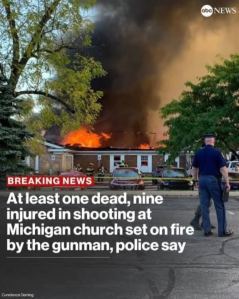
My heart is so heavy thinking of the people of Grand Blanc, MI today.
The tragedy that struck the Latter-Day Saint congregation there is truly heartbreaking.
And yet, it’s not an unfamiliar pain.
I was not even in high school when the Sandy Hook shooting occurred. Now, my entire adult life has been marked by gun violence to the point that many people are numb at the news.
In 2017 when the horrific shooting occurred at the Las Vegas music festival, I wept in my dorm room. As a fan of country music, it hit close to home, because I could easily see myself being there.
Today, I had flashbacks to that feeling as I sat on the stand during sacrament meeting. I thought of where I would hide or how I would flee if something similar happened in my congregation. I fought back tears picturing the abject terror of everyone there.
And then I thought about mourning. The mourning that will soon be forgotten by most Americans as the next tragedy strikes. But the mourning of the congregation that will never stop.
In a world where we are nearly instantly aware of every tragedy, it can feel like too much to weep over every evil happening. And for our mental health, perhaps we cannot. But we are also called to mourn with those that mourn.
I think we need this mourning. We need to acknowledge that these things are painful and that no human deserves to suffer like this.
In these times of tragedy, let’s mourn. Let us fight the urge to be numbed to the tragedies. Because if we are numb, we will normalize this. It is not normal for people to be shot in public spaces. Our schools, our congregations, our theatres, and our communities should be places to come together. In that spirit, let’s mourn and come together. Let’s find a way to keep our hearts soft, while we advocate for a safer world.
A Light So Radiant, It Cannot Be Dimmed
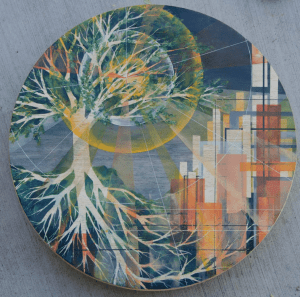
Because the thing about us is this: we’re rainbow, the entire spectrum of light
. . . We are a light so radiant that it will never fully be dimmed.
September 27, 2025
Changemakers: Women Who Boldly Built Zion
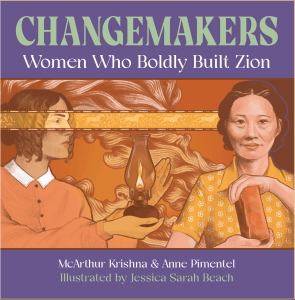
When I browse the children’s sections in bookstores, I am thrilled to see not only women and girls on covers but also diverse faces, hairstyles, and clothing. [This book] joins the ranks of these wonderfully inclusive stories.
As a child, my parents filled our home with books. I have distinct memories of illustrated Bible storybooks that brought to life the Old and New Testaments. We easily owned 50 or more of these books, and I can still recall that my favorite one told the story of Esther and was the only book in our collection featuring a happy, beautifully dressed woman on the cover. Now when I browse the children’s sections in bookstores, I am thrilled to see not only women and girls on covers but also diverse faces, hairstyles, and clothing. Changemakers: Women Who Boldly Built Zion joins the ranks of these wonderfully inclusive stories.
Written by McArthur Krishna and Anne Pimentel, with art by Jessica Sarah Beach, Changemakers: Women Who Boldly Built Zion (Signature Books, March 2025) is an illustrated children’s book about women from the Bible up to to the present day who influenced The Church of Jesus Christ of Latter-day Saints as we know it today.
I was impressed by how much I learned in this short but detailed collection. Each featured woman is introduced with a summary of their life and contribution to the Church, followed by a section with memorable facts and quotes by and/or about them. The collection includes the stories of New Testament characters Lois, Eunice, and Lydia, as well as the stories of Latter-day Saint women Emma Hale Smith, Aurelia Spencer Rogers, Adele Cannon Howells, Chen Lin Shu-Liang, Ada Davis, Mercedes Amparo, Priscilla Sampson-Davis, Ardeth Kapp, Olga Kovarova, and Melissa Wei-Tsing Inouye.
Each section of the book concludes with ways we can be changemakers (for example: “God asks us to build Zion. We can be a changemaker . . . we just have to create and innovate!”), underscoring a lesson for the reader from each featured woman.
Changemakers begins with Lois and Eunice, a grandmother and mother. They are mentioned in the Bible only once, but their story is inspiring because they both understood the importance of passing on the teachings of Christ to younger generations. Commonly at that time, fathers influenced the religious traditions practiced at home. Because Eunice’s husband was of a different faith, Lois and Eunice took on the responsibility of teaching important principles from the Hebrew Bible and sharing their testimonies with Eunice’s son, Timothy. Their influence was so important that they are mentioned by name in 1 Timothy 1:5, “I remember your genuine faith, for you share the faith that first filled your grandmother Lois and your mother Eunice. And I know that same faith continues strong in you.”
The remaining pages highlight the other 12 women’s lives and accomplishments. The book shows how their influences range: from translations of Church teachings and notable tenets of the Gospel, to the creation of well-known publications and artwork, and to the consistent missionary efforts to spread the teachings of Jesus Christ to all parts of the world. We can continue to pay tribute to their lives and positive additions to the Church by having this book on our shelves and sharing its messages with children and youth. McArthur Krishna, Anne Pimentel, and Jessica Sarah Beach have created a lovely and interactive addition to any home gospel library.
Ynna Padilla is a speech-language pathologist who enjoys reading novels, pilates, and surfing.
An open letter to my high school history teacher; TLDR: I was on my period

Dear Mr. [insert name of that cisgender white guy with a trailer classroom who taught history at Pleasant Grove High School – circa 2001],
I don’t remember your name. Frankly, I don’t remember the history (if any?) you taught me. But I do remember a legacy you left in my mind. Here’s what I remember about your class:
I was 14 years old and asked to use the hall pass to go to the bathroom. When I got back to the classroom after my bathroom break, you cornered me and asked where I’d been and why I’d taken so long. When I told you that I’d just gone to the bathroom, you said, “There’s no way that it took you that long to go to the bathroom. You’ve been gone for 15 minutes. You must have done something else. Where have you been?” I insisted that all I’d done was go to the bathroom. You insisted I must be lying. I felt like crying. Eventually you dropped it and moved on with class. I was left shaky with my heartrate elevated.
I realize it’s been 24 years since that conversation. You likely don’t remember it (after all, you weren’t the one left shaking). But, I’m finally ready to answer. Here’s what “really” happened during those 15 minutes:
When I got to the bathroom I realized that I’d started my period. I also pooped because whenever I’m on my period I poop a lot. I also was feeling crampy so was likely moving more slowly than normal. I wiped away as much blood as I could and then put a bunch of toilet paper in my underwear so I could safely walk all the way from your trailer into the school and through to the other side of the school where the sophomore lockers were without bleeding through my clothes. Luckily I had some pads in the locker. I went back to the bathroom to change out the wadded up toilet paper for a pad. I then headed back to class.
After you cornered me, guilt flooded my body.
I was a rule follower. I didn’t like feeling like I’d done something wrong.
When I returned to my seat shaking, I started to think: “Did I not walk fast enough in the halls?” “Could I have put the toilet paper in my underwear faster?” “I should probably put pads in my backpack instead of my locker. But what if they fall out and someone sees them?” “What did I do wrong?”
I felt guilt.
I felt embarrassment.
I worried.
And I wondered what the “right” thing would have been in this situation.
What did I do wrong?
In hindsight, I wish I would have looked you in the eye and said, “You can belittle me the day that blood starts spilling out of your crotch. Until then, please leave me alone.”
Of course, the rule-follower 14-year old version of me would have never said anything like that.
I know my response is coming late. But I think you ought to know. Over 2 decades later, here’s why I think you ought to know:
You left a lasting impression on me in a way you never imagined. You didn’t teach me lasting history lessons. But you taught me that it’s unacceptable to have normal female bodily functions occur during a school day.
I am sure I wasn’t the only 14 year old girl feeling like I was being belittled by a cisgender white guy who assumed the worst in her rather than understanding that 14 year old girls have stuff going on with their bodies.
I am also sure I wasn’t the only 14 year old girl too shy to tell a cisgender white guy what was going on with her body. Side note: 14 year old girls shouldn’t have to explain to high school teachers about periods!
I have a 14 year old girl now. I wonder if things have changed. Will she have experiences like this in high school? Do cisgender white men still assume the worst in girls? Do girls still feel too embarrassed to tell these men off?
It’s not all your fault. We were at Pleasant Grove High School – right smack in the middle of Utah Valley. It was a cultural norm for girls/women to be submissive. It was a cultural norm for everything regarding reproduction to be taboo. It was a cultural norm for cisgender white men to ask embarrassing questions to girls regarding their bodies. So, perhaps we were just products of our culture.
I hope you’ve changed by now.
Sincerely,
Mimi
September 26, 2025
We are the Family of God
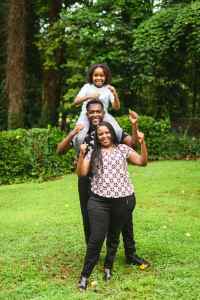 A Proclamation to Anyone Who Will Listen
A Proclamation to Anyone Who Will ListenI, a sovereign woman and member of the Church of Jesus Christ of Latter-Day Saints, joyfully proclaim that God made us “that [we] might have joy.”1 As members of the family of God, we are responsible for supporting and helping each other in all walks of life. This is our eternal destiny.
All human beings, regardless of gender identity, are created in the image of God. Each is a beloved spirit child of our Heavenly Parents, and as such has a divine nature and eternal destiny.2 Our Heavenly Parents love all of Their children and want them to respect themselves and love themselves and others.
In the premortal realm, we were one united family. We learned and worshipped at the knees of our Heavenly Parents. We were thrilled at the opportunity to come to Earth and receive mortal bodies. We embrace the chance to progress and learn in this life and the next. As we all started as siblings in Christ, we believe that relationship continues in this life and the next. I believe that death is not an end to the bonds of love that we create in this life. Sacred ordinances in the Temple are one way to help us reflect on those relationships and what they mean to us. Service, love, sacrifice, communing together, and exploring God’s creations are also important ways to strengthen the bonds of love that we seek for eternity.
I believe that God encourages fidelity between spouses.3 God wants us to honor our relationships and respect the consent and desires of our partner. I testify that the power to create life is powerful and can be a rich expression of love between dedicated spouses. As such, the decision of when, if, and how to have children is deeply personal and ought to remain between a couple and God. God respects the agency of God’s children.
I testify that Jesus Christ stands with individuals whose family lives are not what they wish. Our Savior is our loving brother, and He hears every ache for “what could have been.”
We are all invited to participate in being a part of the family of God. As such, we have a responsibility to care for one another. It is our job as a society to respect the wisdom of our Elders and prepare our children for the future.4 We are invited to turn our hearts to our ancestors and to feel what they have to offer us as they turn to us.5
As members of the family of God, we should all feel it is our responsibility to uplift each other. The responsibility to educate and nurture the future generations is on all of our shoulders. We ought to support parents as they strive to love and guide their children. It is certainly a failing of a society that fails to support parents and leaves them solitary in their endeavors. The responsibility to nurture and care for children ought to be shared between loving partners equally, ensuring that the children and the parents have the support they need. It is also God’s plan and our destiny for us to work together for the salvation of all of God’s children.6 We should strive to make life accessible for all of God’s children, regardless of age, race, sex, ability, or physical conditions. We have a sacred responsibility to treat each other as part of the body of Christ.7 I advocate for structures that ensure every person has the care they need. By divine design, we are all given gifts that we can use to help others find joy.
Happiness in family life is most likely to be found when children know they have the unconditional love of their parents. Jesus Christ shares an example of how to do that. Families should seek wholesome activities, spiritual growth, encouragement, studying out of the “best books,”8 love, repentance, and forgiveness.
I warn that individuals who abuse others are defying God’s commands and the commitments we have to each other. Those individuals are liable for full persecution under the law in addition to being accountable to God. It is our solemn duty to defend victims of abuse and prioritize their safety.
I call upon everyone to remember that we are all children of God. God is “no respecter of persons.”9 We must uplift the downtrodden and champion the marginalized. We are neighbors and it is our duty to love and respect our fellow children of God. I call upon everyone to remember this as they choose how to enact policy and live in their private lives.
2 Nephi 2:25 ↩︎The Family: A Proclamation to the World ↩︎Genesis 2:24 ↩︎Many Indigenous tribes follow this model and deserve to be recognized for the respect they show to God’s children through their social structure. To read more, begin with this article ↩︎Malachi 4:6 ↩︎Mother in Heaven” ↩︎1 Corinthians 12:13 ↩︎D&C 88:118 ↩︎Acts 10:34 ↩︎September 25, 2025
Guest Post – A Discourse on Repentance: Your Guide for Navigating the Repentance Process
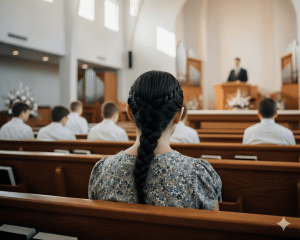
Guest Post by Marth of Bethany
My experience with the LDS Church’s repentance process was an unfortunate one. While recovering from the process, I met with another Bishop and the church’s legal team was involved. Surprisingly, I was asked what I wanted.
My request was simple, to provide a resource on the Gospel Library app or another easily accessible resource that would allow people going through the repentance process know what is appropriate and inappropriate for a bishop to say and do. If I had access to that information, surely my situation could have been prevented. While in the midst of “repentance”, I spent hours trying to grapple with not only the shame I felt for my transgression but also by how poorly I was treated by the bishop. As expected, my request was ignored.
This wasn’t my first experience with a bishop and likely will not be my last, but it sure was a formative one. I find it insightful on how we can find information on polygamy, Kolob, the Kinderhook Plates, the King Follet Sermon and everything in between but guardrails for youth in a bishop’s interview was not easily accessible to me. While it is impossible to provide a “failsafe” guide on what is right or wrong in an interview, I can share some of my tips on if you choose to go through a repentance process.
Bishop Roulette: Bishop Roulette is real. Many people have sacred and spiritual interactions with bishops and experience the positive outcomes of the repentance process. I was not one of those people. Going through the repentance process really is like a box of chocolates, because you never know what kind of Bishop you’re going to get. I got a really bad one.Goals and Boundaries: Know what your personal goals and boundaries are. When you walk into this office, you are probably seeking forgiveness and peace. You’re looking for a stronger connection with the Savior. It’s important to know within yourself what you’re willing to do to get there, and the answer shouldn’t be anything. Develop a deep sense of understanding that the Savior will never expect you to do anything immoral or protect an abuser for you to receive forgiveness.Your Personal Relationship with the Savior: Don’t doubt your own personal connection to the Savior and the Spirit. During my process I was gaslit and I gaslit myself. In church we are taught that sin makes us unworthy of the companionship of the spirit. I sat in that office thinking I deserved what was going on because of my transgressions even though the entire time, the Spirit, my subconsciousness, my gut was telling me this was wrong.Clarify Intentions with the Bishop: Don’t let a bishop work in ambiguity. Don’t let him work in secrecy. In the Book of Mormon, the Gadiaton Robbers were known for their secrets, and that was a problem. Some bishops tend to work in a gray space within the church where they hold a lot of power over people because of their secrets and shame while claiming they have a right to know. Young women like me can get caught in the bad intentions of grown men. Don’t be afraid to ask questions about timelines or expectations in your contact with the bishop. You are expected to be upfront, so they should be too.Set Boundaries: Don’t be afraid to assert physical boundaries. It’s weird when a grown up, who is a male, comes and tries to sit closer to you when you’re in a room alone with them – sometimes late at night. Consider the timing and place of your appointments. It’s weird to meet late at night with a bishop in the church building while no one else is there. Don’t be bullied by bishops into meeting with them during weird times or in weird places.Find a Therapist: Your bishop is most likely not a therapist. So don’t treat them as such. Maybe find one to help you navigate that space.Don’t Go Alone: Consider taking a friend in with you. If a friend is going to judge you in your moment of need, are they really your friend?Don’t Overshare: You don’t have to share and reshare everything. Contrary to what we are taught, bishops don’t actually need to know everything. For example, asking for explicit details over and over again is too much. In addition to that, also know when your bishop is sharing too much, when they begin to talk about their own family, imperfections, or infidelity. Know that that is a red flag.Some Men Like Submissive Women: If you choose to do this process, know that men who are typically in these positions of authority expect women to typically be in their position of submission. Women in the church are taught, sometimes very directly, that they are meant to be submissive. Unfortunately, this is one way you will have a better outcome if you lean into the narrative. The LDS patriarchy views strong women the same way that traditional Christian men view Mother Eve: disobedient, selfish, rebellious, and prideful.I do not understand how the process I went through was supposed to emulate anything remotely to an uplifting spiritual experience, but I hope that you or your daughter, or friend, neighbor, mother, dog, cat, mouse, whoever can use this as a helpful springboard towards navigating their path. Feel free to comment your advice below to help protect our fellow sisters and brothers.

Martha of Bethany is the writing moniker of a lifelong member of the Church who, like her biblical namesake, considers herself a close friend of the Savior. Rooted in faith yet unafraid to wrestle with hard questions, she writes from the tension between devotion and doubt on LDS policies, protocols, and doctrines.
September 24, 2025
Confronting Fearful LDS Second Coming Predictions
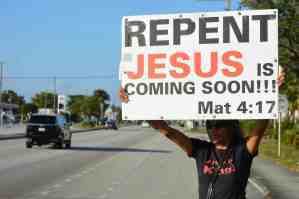
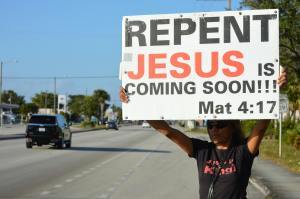
The LDS Church is increasing its warnings of fearful Second Coming predictions. Some report their children and grandchildren are anxious about the scary signs of the end times, which include
Wars, rumors of wars, and great commotion.
Famines, diseases, and earthquakes.
Signs in the heavens (including the sun, the moon, and the stars) and on earth (including fires, tempests, storms, and vapors of smoke).
Wickedness, pride, and cold-heartedness.
In October 2024, General Conference President Russell M. Nelson, prophet of the Church, said: “Brothers and sisters, now is the time for you, and for me, to prepare for the Second Coming of our Lord and Savior, Jesus the Christ.”
In 2019 General Conference, he warned people to go to the temple and complete their temple work, saying, “I plead with you who have distanced yourselves from the Church and with you who have not yet really sought to know that the Savior’s Church has been restored. Do the spiritual work to find out for yourselves, and please do it now. Time is running out.”
Although LDS leaders are increasingly speaking about the imminence of Jesus’ return to the earth, this language is nothing new.
Joseph Smith said, “The coming of the Lord is nigh; it is at the doors.”
Brigham Young proclaimed, “The Latter-day Saints who dwell in these valleys have left their all to gather with the Saints, and for the express purpose of preparing for the coming of the Son of Man.”
Gordon B. Hinckley taught, “The Second Coming of the Lord is near. We must prepare ourselves.”
Even St. Paul expected Jesus to return in his lifetime.
LDS scripture is repleat with horrifying warnings about the events that will procede Jesus’ return to the earth. We read that the Second Coming of Jesus Christ is a “great and dreadful day,” with joy for the righteous and terrible destruction for the wicked. The wicked, who are spiritually unprepared, will face the “fiery indignation of the wrath of God” at the Savior’s return, according to LDS prophecies.
These scriptures can foster pride and complacency in LDS members who assume they are the Lord’s chosen people and fear and trepidation in those who believe they aren’t fully obedient the the Church’s ever-increasing list of rules, requirements, and commandments.
To prepare for the Second Coming, the LDS Church is building lots of temples and urging members to visit them often. It is also hoarding billions of dollars in hedge funds and real estate, and reminding members to store food, water, and money. Although it is wise for anyone to have extra food and savings on hand, many have thrown away a lot of food storage that was ineffectively rotated.
LDS leaders’ end-time rhetoric has motivated some Mormon “preppers” to store vast qualities of food, guns, and survival gear. Others are preparing to return to Independence, Missouri, where they believe Jesus will return to rule and reign on the earth.
Some of my relatives and neighbors are obsessed with “Visions of Glory,” a book about an LDS therapist’s supposed near-death experience when he claimed to see the events preceding the Second Coming. Thom Harrison also claims to have also seen Jesus Christ in one of his near-death experiences. His book, formerly sold at Deseret Book and touted by some BYU and Institute teachers, is now found online. Prepper groups are fascinating by this book and others that warn of upcoming calamities.
Harrison, an active LDS member, has been connected to folks like Tim Ballard, Lori Vallow and Chad Daybell and Jodi Hildebrant and Ruby Franke, to name a few.
Alarmed by LDS leaders’ Second Coming warnings, increasing numbers of LDS members are hoarding food, money, and weapons as they anticipate political upheavals and natural disasters precluding the arrival of Jesus Christ. Some say they will use the weapons to destroy anyone who asks for food assistance.
Recently, a neighbor was disposing of her mother’s personal effects after her death and discovered that her Mormon mother had spent all of her retirement income in food storage which had passed its expiration date and was now moldy and inedible.
A neighbor’s LDS father who died suddenly from a heart attack had used all of his savings to purchase guns, survival gear, and food which he hoarded in a huge basement cache.
An LDS businessman sold his businesses and cashed out his retirement savings to buy a bunker home. For Christmas, he gave each of his married children handcarts to return to Missouri.
Some LDS folks have suggested members move to supposed safe locations to prepare for the Second Coming. Some are moving away from friends and family to live in locations where preppers claim they will be protected during the last days.
Some are leaving their jobs and selling their homes to move to Independence, Missouri, to await the Savior’s return.
LDS leaders warn of the destruction of the wicked upon the Savior’s return and the protection of righteous tithe-payers. Joseph Smith said, “I would advise all the Saints to go to with their might and gather together all their living relatives to this place [the temple] that they may be sealed and saved that they may be prepared against the day that the destroying angel goes forth.”
In a Church-affiliated magazine, BYU professor Donald Parry quotes Joseph Smith, who explained that “the servants of God will not have gone over the nations of the Gentiles, with a warning voice, until the destroying angel will commence to waste the inhabitants of the earth…”
Moreover, “four destroying angels holding power over the “four quarters of the earth until the servants of God are sealed in their foreheads, which signifies sealing the blessing upon their heads, meaning the everlasting covenant, thereby making their calling and election sure.”
The four horsemen of the apocaylpse, warfare, bloodshed, famine, and death are still described in LDS curricula. The references of the four destroying angels and horsemen are found in the Book of Revelation.
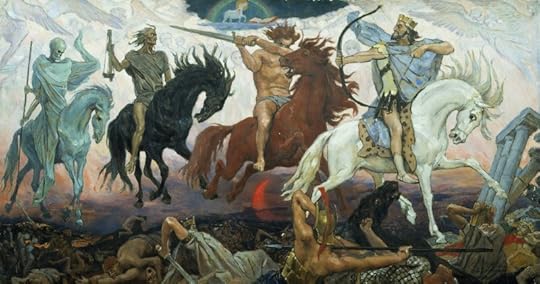
Many Biblical scholars question the authenticity of the Book of Revelation, saying that the author was not John, Jesus’ apostle, and that Revelation refers to events that occurred in Rome in the first century C.E. However, the LDS Church believes that John the apostle wrote the book, and its end times prophecies hinge on many of those apocalyptic visions.
As the Church focuses on temple attendance and wealth accumulation, it too often condones and even supports some doomsayers who advocate for fear. Thom Harrison has been promoted to serve on the General LDS Missionary Committee after making terrifying end-times predictions that include a world financial collapse and “marauding bands of people plundering and stealing in every major city,” and the complete collapse of society. Harrison was also called to serve as a LDS bishop after making many horrifying end-time prophecies.
Chad Daybell, LDS doomsday writer and speaker, attended the temple regularly and his books had been sold by Deseret Book store, an affiliation of the LDS Church. Daybell owned a publishing company, and his own writing focused his own near-death experiences and the end times.
Any church that claims its members will be spared calamity at the Second Coming while others suffer God’s wrath because they do not follow their rules should ask whether it worships a God of love and compassion or a God of vengeance and hate.
End-time fears cause some to believe that because the earth is ending, they need not advocate for peace, wise use of natural resources, or humanitarian aid for those who are staving because they assume war, famine, and political upheavals are part of God’s plan. Rather than speaking up for justice or helping those in need, it is easier for some to sit beneath $200,000 chandeliers, awaiting the Lord’s return and assuming Jesus will solve all earthly problems.
Whether or not Jesus returns in my lifetime, I refuse to live in fear or believe that anyone who thinks differently will be destroyed. Instead, I trust that Jesus will welcome all people with open arms, healing the sick and feeding the hungry as He did during His mortal ministry. I seek to love as He loved and serve as He served, offering small and simple help to those who suffer. I choose to live with kindness, compassion, and charity, trusting that God loves all creation more deeply than we can imagine.
Four Horsemen of the Apocalypse Viktor Vasnetsov, Public domain, via Wikimedia Commons
Blog Photo by Pixels



